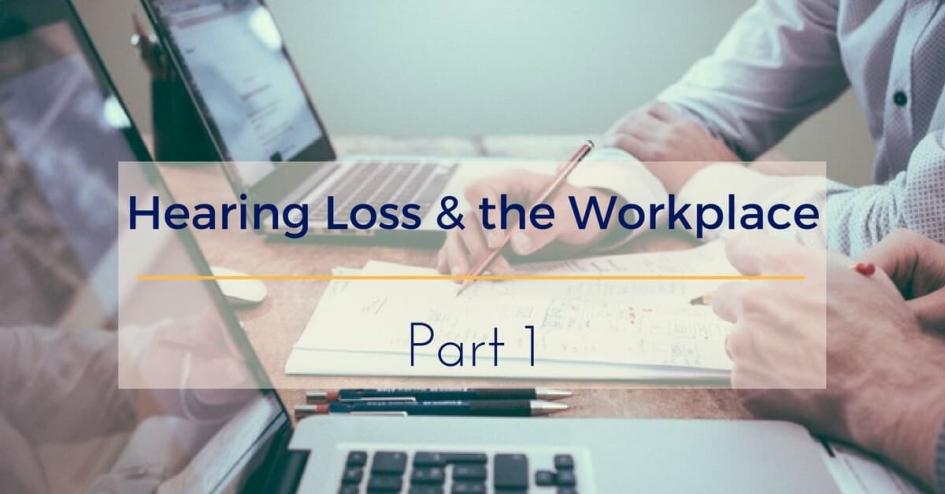
Hearing Loss & the Workplace, Part One
Feb 24, 2017
Most of us will spend a lot of our lives at work. It pays – in more ways than one – if we can be happy, comfortable and productive while we do our jobs. Having a hearing loss may affect how you work, but it shouldn’t prevent you from reaching your full work potential. Thankfully, workplace cultures and hearing technologies are changing, offering you new, positive solutions for working with hearing loss.
There are 10 million people in the UK – 1 in 6 of the population – with hearing loss.
Of those, 3.7 million are of working age, and as pension and retirement ages increase, the number of people with hearing loss in the workplace will rise. In this three-part series, we’ll take a look at some of the challenges faced in the workplace, your legal rights, and how you can manage your hearing loss for a productive, enjoyable work experience.Your rights
First off, it’s important to know that the law is on your side. People with hearing loss are protected by the Equality Act 2010, which prevents discrimination against disabled people at work. All employers are covered by the Act and all workers are protected by it across the UK, with the exception of the Armed Forces. Although you might not use the word “disabled” in relation to yourself, the law defines a disability as:‘A physical or mental impairment which has a substantial and long term adverse effect on your ability to carry out normal day to day activities'For someone with hearing loss, this may include difficulties with communication at work, such as understanding simple verbal instructions or difficulty hearing a conversation. Under the Act, your employer cannot discriminate against you because of your hearing loss. This includes the recruitment process, employment, pay, promotion, training, dismissal, retirement and redundancy. As long as they are aware of your disability, they are responsible for providing reasonable adjustments (changes) in the workplace, to help you perform your job better. This may include physical changes to the office or investing in hearing technologies to help you in certain situations. Action on Hearing Loss (RNID) offer a series of factsheets to explain the rights of people with hearing loss. You can also contact Advice Now for further legal advice.
Challenges
Whether you’re attending meetings, providing customer service or chit-chatting in the staffroom, communication is an essential part of most workplaces. For people with untreated hearing loss, communication is also the main source of difficulty at work. They may struggle to follow discussions and instructions and be more likely to make mistakes. As a result, some people feel unable or unwilling to take part in trainings, meetings, phone calls or conferences. This can leave people feeling distant from colleagues and unsure if they are doing their job correctly, leading to a loss of confidence and difficulties with team-building across the department. Untreated hearing loss has also been linked to depression and even cognitive decline, which can have a knock-on effect on your work performance. A survey carried out by RNID revealed that two-thirds (68%) of people felt that their hearing loss left them feeling isolated at work. A similar number (70%) said that it prevented them from fulfilling their potential at work. Untreated hearing loss is also a health and safety risk, as most businesses rely on auditory alarms in the event of fire and evacuation. If you work in a situation where you are responsible for others’ safety, this can be a serious hazard. Thankfully, workplaces are changing for the better. Employers are more aware of the issues surrounding hearing loss, and are required by law to make reasonable adjustments for their employees. Technology is also changing fast and new options for improving hearing are now widely available.The first step – get treated for hearing loss
If you think you have a hearing loss, it’s crucial to get tested and treated as soon as possible. The sooner you act, the sooner you will improve your quality of life and solve most of the communication problems mentioned above. Modern hearing aids use new technologies to improve your hearing in different situations. As a result, communication will be much easier and your confidence in interacting with clients, customers and colleagues will grow. Treating your hearing loss is the first and most important step in improving how you work. In the next blog post, we’ll take a look at reasonable adjustments and explain how making some changes to your workplace layout and communication technologies can make a big difference to your work performance.If you’d like information about hearing loss, hearing aids and hearing technologies, contact us at House of Hearing. You can give us a call on 0131 220 1220, or simply pop into one of our centres.
Our Clinics
All House of Hearing clinics are in town centre locations and accessible to public transport and parking. Home visits also available if mobility is an issue.


.png)
.png)
.png)

.png)
